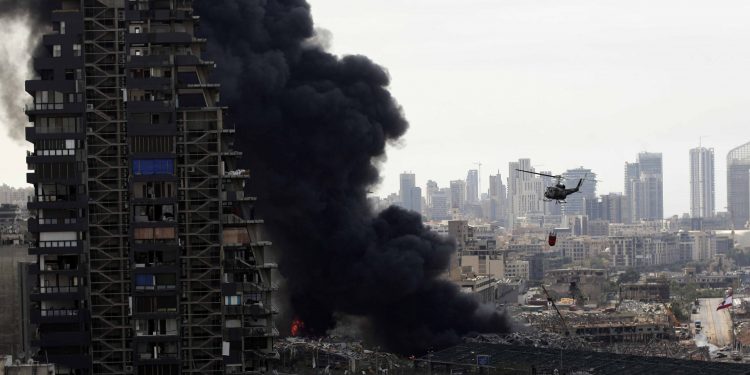Beirut: A huge fire broke out Thursday at the Port of Beirut, sending up a thick column of black smoke. The huge fire raised new panic among traumatised residents after last month’s catastrophic blast at the same site killed nearly 200 people.
It was unclear what caused the blaze at the facility, which was decimated by the August 4 explosion. On that day nearly 3,000 tonne of ammonium nitrate blew up. The explosion sent out a shock wave that caused widespread damage and was felt as far away as the island of Cyprus.
Dark smoke covered the Lebanon capital Thursday as army helicopters sprayed water over the orange flames leaping from the ground. The Lebanese army said the fire started in the port’s duty free zone at a warehouse. The warehouse stored containers of tires, oil and other flammable materials.
Panicked residents cracked open windows and called and texted each other to warn them of the new danger. Local TV stations said companies that have offices near the port asked employees to leave the area. Some hid in bathrooms, while others dropped what they were doing and rushed home.
“We opened all windows and are in the corridor right now,” said Dana Awad, a mother of two girls in a Beirut neighborhood. She recalled the tremor that preceded the earlier explosion. “I am still feeling the earth shake. Living a flashback.”
A video on social media showed port employees running in fear from the fire. The video was a chilling reminder of the dozens of workers and 10 firefighters who were killed in the blast. Lebanese troops closed the major road near the port, rerouting traffic to other areas.
The August 4 explosion killed 191 people, injured about 6,500 and damaged thousands of buildings. The explosion, the single most destructive blast in Lebanon’s history, is blamed on government negligence and mismanagement.
There was speculation here that Thursday’s fire could be an attempt to destroy evidence from the explosion. Port director Bassem al-Qaisi told ‘Voice of Lebanon’ radio the fire started in a warehouse where barrels of cooking oil were kept.
“It is too early to know if it is the result of heat or some other mistake,” al-Qaissi said. He added that the black smoke was from burning tires.
The panic was compounded by the fear that more chemicals could be in the wreckage of the port. Earlier this month, the army said it discovered more than four tonne of ammonium nitrate in four containers stored near the port that it said were ‘dealt with’.
French and Italian chemical experts working amid the remains of the port identified more than 20 containers of dangerous chemicals. The army later said these containers were moved and stored safely away from the port.






































